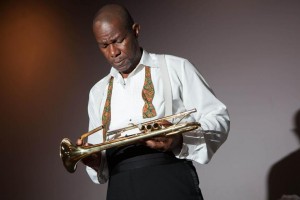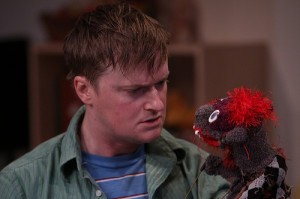 I’m pleased to announce yet another staging of Satchmo at the Waldorf, my first play, in the upcoming 2015-16 season. Immediately after the show concludes its run at San Francisco’s American Conservatory Theater next February, the production, a remount of the 2014 off-Broadway staging directed by Gordon Edelstein and starring John Douglas Thompson, will transfer directly to Theatreworks, located on the campus of the University of Colorado, Colorado Springs. It will open there on February 18 and run through March 6.
I’m pleased to announce yet another staging of Satchmo at the Waldorf, my first play, in the upcoming 2015-16 season. Immediately after the show concludes its run at San Francisco’s American Conservatory Theater next February, the production, a remount of the 2014 off-Broadway staging directed by Gordon Edelstein and starring John Douglas Thompson, will transfer directly to Theatreworks, located on the campus of the University of Colorado, Colorado Springs. It will open there on February 18 and run through March 6.
For more information, go here.
To read about other upcoming productions of Satchmo at the Waldorf, go here.



 Nothing is more exciting than a new play that takes you by surprise, and Robert Askins’ “Hand to God,” which has moved uptown after two successful off-Broadway runs, does so over and over again. It is, at first blush, a raucously foul-mouthed little farce about Jason (Steven Boyer), a timid, sexually inhibited teenage puppeteer from Texas whose sock puppet, an unassuming-looking beastie named Tyrone, appears to be possessed by the Great Anarch Himself. But scratch the surface and you’ll find a dead-serious black comedy in which the disruptive power of lust is dramatized in a manner so outrageous as to recall the ruthlessly funny plays of Joe Orton.
Nothing is more exciting than a new play that takes you by surprise, and Robert Askins’ “Hand to God,” which has moved uptown after two successful off-Broadway runs, does so over and over again. It is, at first blush, a raucously foul-mouthed little farce about Jason (Steven Boyer), a timid, sexually inhibited teenage puppeteer from Texas whose sock puppet, an unassuming-looking beastie named Tyrone, appears to be possessed by the Great Anarch Himself. But scratch the surface and you’ll find a dead-serious black comedy in which the disruptive power of lust is dramatized in a manner so outrageous as to recall the ruthlessly funny plays of Joe Orton. I haven’t read either of Ms. Mantel’s much-praised novels, nor am I a scholar of 16th-century England. I can, however, assure you that Mr. Poulton’s five-and-a-half-hour stage version of “Wolf Hall,” unlike Bolt’s immaculately crafted, endlessly quotable play, is competent but dullish…
I haven’t read either of Ms. Mantel’s much-praised novels, nor am I a scholar of 16th-century England. I can, however, assure you that Mr. Poulton’s five-and-a-half-hour stage version of “Wolf Hall,” unlike Bolt’s immaculately crafted, endlessly quotable play, is competent but dullish… It’s a byword in the theater world that you can make a killing on Broadway, but not a living. Time was, however, when major plays usually had a decent chance of succeeding there. The original 1947 production of “A Streetcar Named Desire,” for example, ran for two years—nothing to brag about next to “The Phantom of the Opera,” but spectacular by any other standard. And as late as 2007, Tracy Letts’ “August: Osage County,” a three-and-a-half-hour play acted by a cast of unknowns from Chicago, ran for a year and a half solely on the strength of its high quality. Once again, though, the conventional wisdom says those days are gone for good. Today’s playgoers, we’re told, prefer fluffier fare and will only pay top dollar to see movie and TV stars onstage.
It’s a byword in the theater world that you can make a killing on Broadway, but not a living. Time was, however, when major plays usually had a decent chance of succeeding there. The original 1947 production of “A Streetcar Named Desire,” for example, ran for two years—nothing to brag about next to “The Phantom of the Opera,” but spectacular by any other standard. And as late as 2007, Tracy Letts’ “August: Osage County,” a three-and-a-half-hour play acted by a cast of unknowns from Chicago, ran for a year and a half solely on the strength of its high quality. Once again, though, the conventional wisdom says those days are gone for good. Today’s playgoers, we’re told, prefer fluffier fare and will only pay top dollar to see movie and TV stars onstage. Kathy Teachout, my sister-in-law, has just retired from the city council of Smalltown, U.S.A., after two consecutive terms. She succeeded David, my brother, who had previously held the same seat on the council for two consecutive terms. It was a natural development for them both: they’d long been deeply involved in a variety of worthy local causes, and so they decided that the time had come to step up to the plate and run for office. My admiration for what they did was—and is—boundless. “I don’t mean to sound pompous,” I told Kathy the other day, “but that’s what democracy is all about.”
Kathy Teachout, my sister-in-law, has just retired from the city council of Smalltown, U.S.A., after two consecutive terms. She succeeded David, my brother, who had previously held the same seat on the council for two consecutive terms. It was a natural development for them both: they’d long been deeply involved in a variety of worthy local causes, and so they decided that the time had come to step up to the plate and run for office. My admiration for what they did was—and is—boundless. “I don’t mean to sound pompous,” I told Kathy the other day, “but that’s what democracy is all about.” I’m proud of having sat on the NCA, but it doesn’t hold a candle to what David and Kathy did to make the town in which the three of us grew up a better and safer place to live. They took their duties with the utmost seriousness and put in a lot of hard, committed work, and the local citizens showed their appreciation by re-electing them to second terms—for which they both ran unopposed. In a small town where pretty much everybody knows you, there is no higher praise.
I’m proud of having sat on the NCA, but it doesn’t hold a candle to what David and Kathy did to make the town in which the three of us grew up a better and safer place to live. They took their duties with the utmost seriousness and put in a lot of hard, committed work, and the local citizens showed their appreciation by re-electing them to second terms—for which they both ran unopposed. In a small town where pretty much everybody knows you, there is no higher praise. •
•